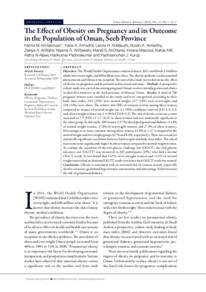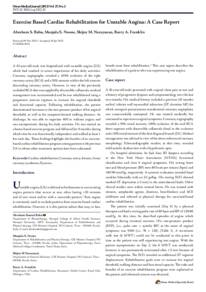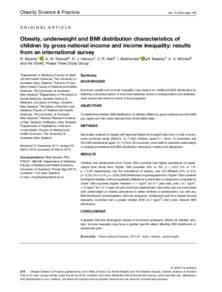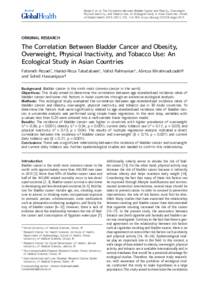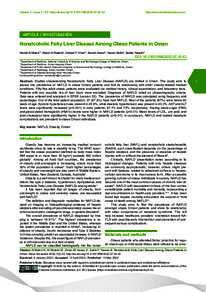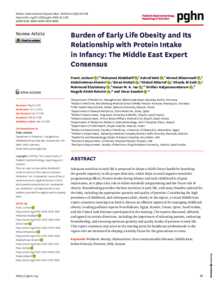Document
The effect of obesity on pregnancy and its outcome in the population of Oman, Seeb Province.
Identifier
DOI 10.5001/omj.2016.03
Publisher
Oman Medical Specialty Board.
Gregorian
2016-01
Language
English
Subject
English abstract
Objectives: The World Health Organization estimated that in 2011 worldwide 1.6 billion adults were overweight, and 400 million were obese. The obesity epidemic is a documented phenomenon and Oman is no exception. The aim of this study was to determine the effect of obesity on pregnancy and its prenatal and neonatal outcomes. Methods: A prospective cohort study was carried out among pregnant Omani women attending antenatal clinics in their first trimester in the Seeb province of Muscat, Oman. Results: A total of 700 pregnant women were enrolled in the study and were categorized according to their body mass index: 245 (35%) were normal weight, 217 (31%) were overweight, and 238 (34%) were obese. The relative risk (RR) of cesarean section among obese women compared to women of normal weight was 2.1 (95% confidence interval (CI) 1.2–3.2) and of overweight women was 1.4 (95% CI 0.9–2.3). The risk of elective cesarean section increased to 7.5 (95% CI 1.7–32.8) in obese women and was statistically significant in the obese group. In this study, 100 women (15.7%) developed gestational diabetes (11.8% of normal weight women, 17.8% of overweight women, and 17.9% of obese women). Miscarriages were more common among obese women 11.9% (n = 27) compared to the normal weight and overweight groups (6.7% and 9.4%, respectively). There was a weak yet statistically significant correlation between birth weight and body mass index. The risk of macrosomia was significantly higher in obese women compared to normal weight women. To evaluate the sensitivity of the oral glucose challenge test (OGCT), the oral glucose tolerance test (OGTT) was measured in 203 participants (29%) who had a normal OGCT result. It was found that 14.5% of overweight women and 13.5% of normal weight women had an abnormal OGTT result even when their OGCT result was normal. Conclusions: Obesity is associated with an increased risk of cesarean section (especially elective cesarean), gestational hypertension, macrosomia, and miscarriage. It also increases the risk of gestational diabetes.
Member of
Resource URL
Citation
Babu, Abraham Sunderlal (2016). The effect of obesity on pregnancy and its outcome in the population of Oman, Seeb Province. Oman Medical Journal, 31 (1), 12-17.
Category
Journal articles

